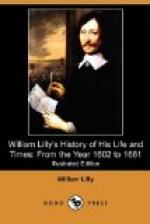Davy Ramsey, his Majesty’s clock-maker, had been informed, that there was a great quantity of treasure buried in the cloyster of Westminster-Abbey; he acquaints Dean Williams therewith, who was also then Bishop of Lincoln; the Dean gave him liberty to search after it, with this proviso, that if any was discovered, his church should have a share of it. Davy Ramsey finds out one John Scott,[9] who pretended the use of the Mosaical rods, to assist him herein: I was desired to join with him, unto which I consented. One winter’s night, Davy Ramsey, with several gentlemen, myself, and Scott, entered the cloysters; we played the hazel-rod round about the cloyster; upon the west-side of the cloysters the rods turned one over another, an argument that the treasure was there. The labourers digged at least six foot deep, and then we met with a coffin; but in regard it was not heavy, we did not open, which we afterwards much repented. From the cloysters we went into the Abbey church, where, upon a sudden, (there being no wind when we began) so fierce, so high, so blustering and loud a wind did rise, that we verily believed the west-end of the church would have fallen upon us; our rods would not move at all; the candles and torches, all but one, were extinguished, or burned very dimly.[10] John Scott, my partner, was amazed, looked pale, knew not what to think or do, until I gave directions and command to dismiss the daemons; which when done, all was quiet again, and each man returned unto his lodging late, about twelve o’clock at night; I could never since be induced to join with any in such-like actions.
[Footnote 9: This Scott
lived in Pudding-Lane, and had some time
been a page (or such like)
to the Lord Norris.]
[Footnote 10: Davy Ramsey
brought an half quartern sack to put
the treasure in.]
The true miscarriage of the business, was by reason of so many people being present at the operation; for there was about thirty, some laughing, others deriding us; so that if we had not dismissed the daemons, I believe most part of the Abbey church had been blown down; secrecy and intelligent operators, with a strong confidence and knowledge of what they are doing, are best for this work.
In 1634, or 1635, a Lady living in Greenwich, who had tried all the known artists in London, but to no purpose, came weeping and lamenting her condition, which was this: she had permitted a young Lord to have the use of her body, till she was with child by him; after which time he could not or would not endure her sight, but commanded his lacquies and servants to keep his doors fast shut, lest she should get into his chamber; or if they chanced to see her near his lodging, to drive her away, which they several times had done. Her desire unto me was to assist her to see him, and then she should be content; whereupon I ordered, such a day, such an hour of that day, to try her fortune once more. She obeyed; and when




